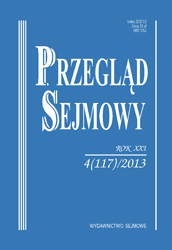Powierzenie kompetencji na rzecz Unii Europejskiej a Traktat o Europejskim Mechanizmie Stabilności i Traktat o unii fiskalnej. Uwagi w świetle orzecznictwa Federalnego Trybunału Konstytucyjnego i wyroku Trybunału Sprawiedliwości UE w sprawie C-370/1
Conferral of Competences on the European Union and the Treaty Establishing the European Stability Mechanism and the Treaty on Stability, Coordination and Governance in Economic and Monetary Union: Comments (...)
Jurisprudence of German Federal Const
Author(s): Jan Barcz, Jerzy KranzSubject(s): Constitutional Law, EU-Approach / EU-Accession / EU-Development
Published by: Kancelaria Sejmu
Keywords: European Union; European Stability Mechanism; European Economic and Monetary Union, euro area; conferral of powers; Treaty on Stability; Coordination and Governance in Economic and Monetary Union; Ger
Summary/Abstract: The article contains an analysis of the jurisprudence of German Federal Constitutional Court andthe European Court of Justice judgment in the Pringle case (C-370/12). First of all, they examinedconsistency with EU law of the Treaty establishing the European Stability Mechanism and theTreaty on Stability, Coordination and Governance in Economic and Monetary Union (Fiscal Compact), both adopted beyond the institutional legal framework of the European Union. The analysisof this jurisprudence unequivocally reveals that the said treaties do not violate EU law, nordo they involve a conferral of new competences on the European Union by its member states.Secondly, this analysis shows that the case-law (particularly, the judgment of the European Courtof Justice) legitimizes, to an extent, the so-call Schengen method, setting — at the same time —the legal framework for future inter-governmental measures to be taken for consolidation of the Eurozone. From the above-mentioned case-law it follows that the procedure used in Poland for approvalof the decision of the European Council (2011/199/EU) and for ratification of the Fiscal Compact was reasonable. That procedure may be applied in the future for ratification of the Treaty establishing the European Stability Mechanism
Journal: Przegląd Sejmowy
- Issue Year: 2013
- Issue No: 4
- Page Range: 23-47
- Page Count: 25
- Language: Polish

